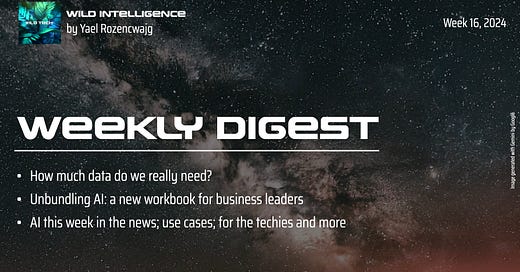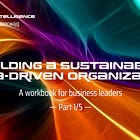📨 Weekly digest: 16 2024 | How much data do we really need?
Who does that serve? | AI this week in the news; use cases; for the techies
Hello friends,
Today, I share with you a question that has been in my mind since… always.
On the one hand, we see more and more companies offering cloud-based data storage and analytics services, often called "data-as-a-service." But more often than not, their main focus is a concept they promote, “data cloud.”
Data cloud refers to a system designed to store, manage, and analyze data in the cloud, but in a way that breaks down data silos and allows for collaboration across an organization or even with external partners. Imagine a central location for all your data, accessible and usable anywhere. They provide the platforms that make the data cloud possible. Their cloud-based data platform offers features like scaling, security, and workloads, from data warehousing to data science.
Their common goal is to make it easier for organizations to leverage the power of their data.
However, there are many concerns about why companies collect so much data. Not always for good or right reasons. Here are some of the big ones:
Understanding their customers: Data helps companies learn what people want and need. This can help them develop better products and services, target their marketing more effectively, and improve customer service.
Making better decisions: Data can help companies track trends, identify problems, and make data-driven decisions. This can lead to more efficient operations, reduced costs, and increased profits.
Personalization: Companies can use data to personalize the user experience. This can include things like showing you targeted ads, recommending products you might be interested in, or tailoring the content you see on a website.
It's important to be aware of your privacy settings and to choose companies that are transparent about their data practices.
On the other hand—LLMs are essentially powered by data—and the quality and quantity of data they are trained on heavily influences their capabilities. LLMs are trained on massive amounts of text and code data. This data can include books, articles, code repositories, web pages, and even social media conversations. The more data an LLM is trained on, the better it understands the nuances of language and the stronger its ability to generate human-quality text, translate languages, write different kinds of creative content, and answer your questions in an informative way.
The data used to train LLMs can also reflect real-world biases. If an LLM is trained on a dataset that contains sexist or racist language, it may generate text that reflects those biases. It's important to be aware of this potential bias and to use LLMs critically. Who controls what?
Just as they are trained on data, LLMs can also be used to improve data quality. For instance, they can be used to identify and correct errors in text data or to classify and categorize large amounts of unstructured data. How do companies manage?
As LLM technology advances, there's a growing need for new data types for training. This could include data that is more diverse, factual, or secure. How is data used effectively and ethically? In what context?
In essence, data is the food that LLMs thrive on. The more data and the more varied the data, the better LLMs understand and use language. However, it's important to consider the quality and potential biases within the data to ensure LLMs are used effectively and ethically.
What do you think?
If you haven't already, you can start with our workbook, Building a data-driven organization.
I am looking forward to reading your thoughts in a comment.
Happy days,
Yael et al.
🦾 AI elsewhere on the interweb
CMA outlines growing concerns in markets for AI Foundation Models on Gov UK
Adobe is buying videos for $3 per minute to build AI model on Bloomberg
Introducing our next generation infrastructure for AI on Meta
Fast access to our weekly posts
🚀 Unbundling AI
🎲 Data and trends
🚨❓ Big questions
📨 Weekly digest
You are receiving this email because you signed up for Sustainability Insights by Yael Rozencwajg. Thank you for being so interested in our newsletter!
Weekly digest are part of Sustainability Insights, approaches and strategies.
We share tips to help you lead, launch and grow your sustainable enterprise.
Become a premium member, and get our tools to start building your AI based- enterprise.
Not a premium?
Thank you for being a subscriber and for your ongoing support.
If you haven’t already, consider becoming a paying subscriber and joining our growing community.
To support this work for free, consider “liking” this post by tapping the heart icon, sharing it on social media, and/or forwarding it to a friend.
Every little bit helps!







